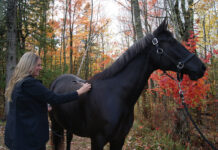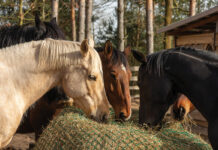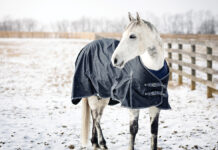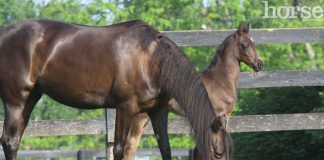Being outside at the barn means you might occasionally deal with wild animals, including skunks. Your horses and dogs also risk exposure to these smelly creatures and a potential spray attack. Here are some tips to getting rid of skunk smell on your dogs and horses:
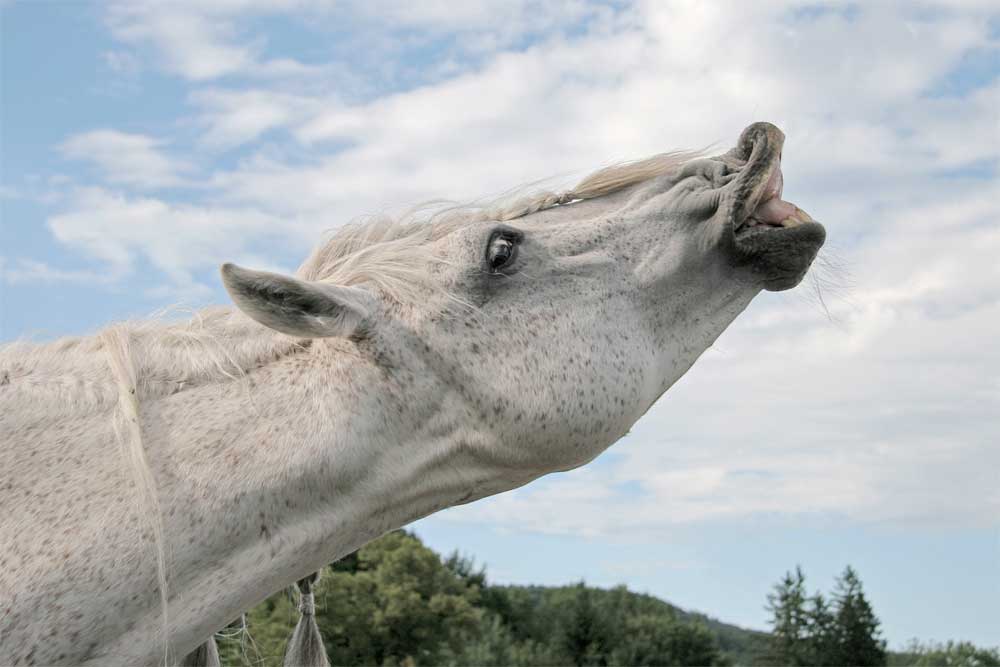
The Skunk and All Its Odorous Glory
Before diving into the stinky business of de-skunking, it’s helpful to know why skunks smell in the first place.
“The odor [of skunks] is produced in the anal glands, which all carnivores—including dogs and cats—have,” says Ted Stankowich, Ph.D., associate professor of biological sciences at California State University in Long Beach, California. “The anal glands of skunks are much larger though, and produce specialized molecules that contain sulfur, called ‘thiols,’ that are noxious.
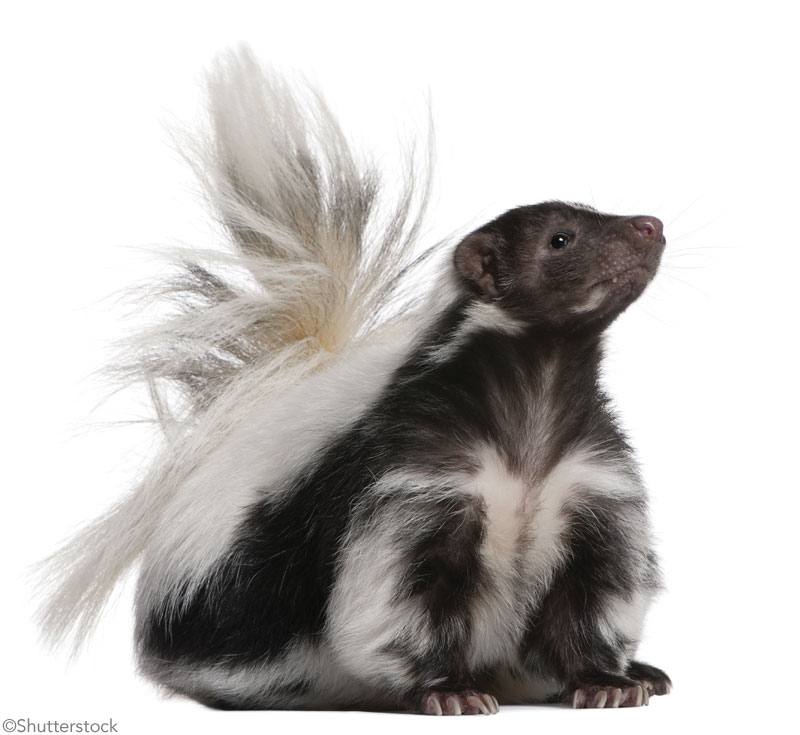
“They also have specialized spraying ‘nipples’ inside the rectum that are pushed outward and spray the oil,” he continues. “The oil doesn’t get on the skunk itself, so skunks that aren’t actively spraying actually don’t smell any different from any other mammal.”
Skunks use their “superpower” of putrid odor to defend themselves. According to Dr. Stankowich, they commonly use their odors when they’re defending against hungry coyotes and cougars, which are their natural predators.
Though they are wild animals, that doesn’t stop skunks from wandering around beyond their natural habitat, which means there’s a possibility one might end up in your barn.
Though they are wild animals, that doesn’t stop skunks from wandering around beyond their natural habitat, which means there’s a possibility one might end up in your barn.
David Ramey, DVM, owner of Ramey Equine in Sunland, California, explains that if a skunk wanders by, preventing an attack is challenging.
“[Dogs and horses] both [usually] get skunked the same way—they let their curiosity get the best of them,” Dr. Ramey says.
Getting Rid of Skunk Smell on Your Horse and Dog
Did you find your horse or dog sprayed by a skunk? Keep calm, put on some old clothes that you don’t mind tossing and grab some gloves to get rid of the skunk smell on your horse or dog.
“First get the animal controlled and keep it outside,” Dr. Stankowich says.
By confining the animal in an enclosed outdoor space, you’re also controlling the odor and making sure it doesn’t spread around to places like your house or car.
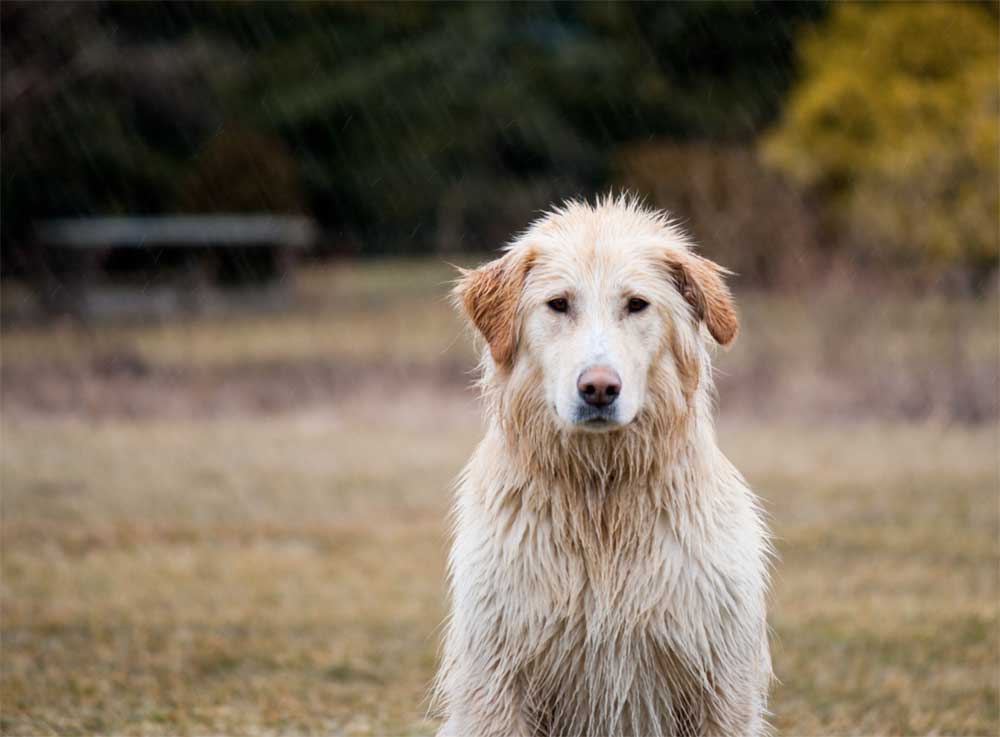
Once your horse or dog is safe and contained, it’s time to begin the de-skunking process. Wash your pet with a mixture of soap, hydrogen peroxide and baking soda. Do not add water, as this can make it worse, says Liv Gude, founder of ProEquineGrooms.com and a former professional groom for Olympic dressage riders.
“This may cause the skunk oil to move to more places as well as dilute the cleaning solution,” she says.
Homemade Deskunker Recipe
Gude recommends this tried and true recipe:
- 1 quart of hydrogen peroxide (or vinegar if you don’t have any hydrogen peroxide)
- 1/4 cup of baking soda
- 1 teaspoon of dish soap
“That will oxidize the thiols and convert them into molecules that have no odor,” she says.
One batch may not cover all of the animal’s skunked parts. Or, the first wash might not eliminate the odor. Do not double up on ingredients to make a larger batch, Gude says, because hydrogen peroxide breaks down so quickly. You’ll have to make each batch one at time, and it is common to need several batches to completely eliminate the skunk smell.
“It may take a few rounds to get the scent out completely, and the fur will probably lighten a bit,” Gude explains, “but it’s the best way to neutralize the smell.”
Once you’ve mixed together a batch, use a rag to wipe the formula on the animal. Repeat until the odor is gone.
Always call your veterinarian for advice on dealing with any skunk oil that has gotten into your pet’s nose, eyes or other sensitive areas. Gude also warns that skunks can transmit rabies, so your vet might need to administer a rabies vaccination booster and check your dog or horse for any wounds.
Getting Rid of Skunk Smell Pet Supplies and Clothing
Once your pet is effectively de-skunked, it’s time to take care of any horse or dog supplies that might have been sprayed.
Should the dog collar and/or leash get sprayed, Dr. Ramey suggests using bleach because it helps oxidize the thiols. To help remove the skunk odor, soak the supplies in a ratio of 1:4 bleach solution—1 part bleach to 4 parts water. Note: Certain materials, such as cotton or leather, may be discolored by the bleach.
Getting Rid of Skunk Smell on Leather
Leather horse supplies may take more time. First, call the manufacturer of your saddle. Depending on the type of leather used, the manufacturer may be able to provide specific instructions.
Generally, you can use a paste of baking soda and water to de-skunk your leather tack, Gude says. To create the paste, mix the two ingredients together until you get the consistency of toothpaste. Coat your tack with the paste and let it sit and dry. Repeat as necessary. After the baking soda, deep clean and condition your tack according to the manufacturer’s suggestions.
Getting Rid of Skunk Smell on Your Clothes
If you happen to get sprayed yourself, or the odor spreads to your clothes, Dr. Stankowich recommends handwashing your clothes in very diluted bleach and repeat until the smell is gone. You can put more concentrated bleach on the precise spots with spray, but handwashing with diluted bleach is safest for your clothes, according to Dr. Stankowich.
He also recommends using OxyClean.
“I’ve used OxyClean on my own field clothes, and a few washings will usually get rid of a light skunk odor,” he says.
Skunk-Proofing Your Barn
While you can’t completely keep skunks from wandering to your barn, you can take precautions to make them less likely to approach.
The best way to skunk-proof your property is to not have any food, trash, or water outside, Dr. Stankowich says. Keep trash bins closed, make sure there are no openings under your house and remove any piles of rocks, branches or logs where skunks can burrow and make a den.
When protecting your barn, keep your tack room and feed rooms secure at all times. Stay active on all parts of your property so that critters know they are not welcome there, Gude says. Your local animal control can help you with any skunk-specific questions if you see one on your property.
Although a skunk spraying you, your horse or your dog is a stinky situation, you now know how to get rid of that awful skunk smell!

